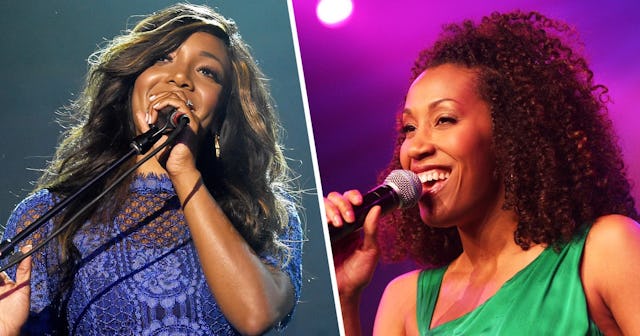Black Women Deserve Space In Country Music Too

My oldest daughter was a year old when we heard a fresh voice on our favorite music station. We later learned it was Rissi Palmer, a new country music artist, who captivated us with her song Country Girl. A few years later, we were watching a live holiday performance, when a stunning woman, one we had never heard before, stepped on stage and blew us away with her rendition of Do You Wanna Build a Snowman? A quick Google search led us to discover that the woman was newcomer Mickey Guyton. These women stood out to us because of their angelic voices and the fact that they’re black women.
Since their debuts into mainstream and popular media, both Rissi Palmer and Mickey Guyton have paved the way for others—both in and out of the country music arena. However, this hasn’t been without multiple uphill, ongoing battles. Country music fans, executives, and artists are overwhelmingly white and male. Yes, that damn patriarchy is getting in the way again. Women, and especially women of color, have had to fight relentlessly for a place in the country music industry.
Singer Rissi Palmer performs during the 43rd annual Academy Of Country Music Awards All-Star Jam. Ethan Miller/Getty
Rissi Palmer told Scary Mommy that being a country music artist and a woman of color was difficult because people, both black and white, made assumptions about her. “I felt like I was constantly being asked to prove myself and having my intentions and credentials questioned,” she said. Another issue? Even today, turn on a country music station, and you’ll hear the same handful of artists—mostly white and male—being played over and over again, she shared.
My husband and I grew up in Southern Illinois, where everyone listened to country music. Jacked-up pick up trucks filled the fast food parking lots, and for fun, teens and young adults would go muddin’, fishin’, and huntin’. Almost every country music singer at that time was a white male, with the exception of the Shania Twain, Martina McBride, and Reba McIntire. Today, things have changed, and there are more people of color in the country music industry than ever before, though they are disproportionately male.
Now we’re parents, raising four children of color. And yes, we still listen to some country music, among several other genres. However, we are ever-cognizant that our children need racial mirrors, and one way we can provide that is by listening—AKA, supporting—black artists. Since my kids were very young, they each loved learning that someone was, in their words, “brown like me.” Representation really does matter—a lot.
In very recent years, the country music radio stations—and even pop and top forty stations—have played some incredible artists. Lil’ Nas X’s “Old Town Road,” with co-singer Billy Ray Cyrus, was Billboard’s 2019 summer song of the year, spending 14 weeks in the number one slot. Remember Darius Rucker from Hootie and the Blowfish? He’s now a solo country artist. Newcomers Kane Brown and Jimmie Allen are wildly popular among country music fans, and both are men of color.
Singer-songwriter Mickey Guyton performs onstage at the Innovation In Music Awards. Rick Diamond/Getty
But what about the ladies? In an industry that in infiltrated by males, how can females, especially women of color, carve out a space? Is all hope lost? Rissi Palmer shared that there is hope. Because of YouTube, social media, and streaming, artists aren’t confined to gaining popularity by radio-play only. She also shared that country music fans are, in fact, diverse and open to artists of all backgrounds. If you aren’t convinced that country music is incredible, just listen to What Are You Going to Tell Her?, the latest song by Mickey Guyton. I dare you not to cry.
While Guyton is still performing as a country music artist, Palmer has evolved. She considers herself a Southern Soul artist, in which her style is a mixture of pop, soul, and country. Palmer and Guyton’s ongoing careers beg the question, if they aren’t limiting themselves and the fans want more, why are radio stations and concert venues keeping them under wraps, excluding them in favor of male artists?
Palmer warns that if radio stations don’t sit up and pay attention to female artists, they may not survive. They need to play a variety of country music styles, including traditional, contemporary, alt-country, and Americana and make sure those artists include females. She said, “There is so much great music that the masses are missing out on because terrestrial radio is sticking to a corporate playlist.”
After I interviewed Palmer, my family and I were on a short weekend trip to a school basketball tournament. We scanned local radio stations to find one playing a song my son liked. We listened for awhile in silence, when I realized the past seven songs were all sung by white male country music artists. I pointed it out to my husband who hadn’t noticed. It was in that moment that we realized how conditioned we had become to accept the white male norm in country music.
It’s very important to our family to see representation in every industry. It teaches our children that they can be anything they wish to be. As Palmer told me, “Black women are not a monolith. [. . .] We do it all. We just need visibility.”
This article was originally published on